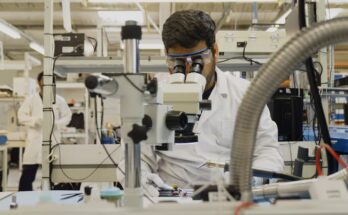The phone rings and a female voice begins to speak, describing in detail the characteristics of a job for a restaurant. Her name is María and she asks her interlocutor questions. When interrupted, redirect the conversation seamlessly. It is a conversation that Irene Martínez (20 years old) or Mario García (21 years old) want to have to find work for this Black Friday campaign, which will generate 110,000 jobs, according to Randstad. The nuance is that María is not a person, but an artificial intelligence (AI) bot developed by the company Orbio, capable of reasoning, asking, and behaving like a person on the other end of the telephone line. The use of artificial intelligence in some stages of employee recruitment is a growing trend. According to the job search portal Infojobs, one in two Spanish companies already uses this technology during the worker selection process. The experts consulted predict that its use will increase, but Martínez and García question the ability of this method to correctly assess their abilities or the fear that it introduces biases that could discriminate against certain groups based on race or sex.
García, who studies computer engineering, hopes to get a job for this commercial campaign and wants to be interviewed by a person, not artificial intelligence. He assures that the preparation for accessing a job changes “quite a bit” if this technology intervenes, since the conversation with a person is more fluid and generates “more trust”. Martínez joins this topic and adds that a bot like María does not have the ability to “evaluate non-verbal communication or the emotions that could be transmitted”, which she considers fundamental for her professional future (she is studying to become a nurse). Furthermore, it is stated that the use of artificial intelligence can increase the risk of pre-emptive conditioning during the interview. “It will be programmed to select people with very specific characteristics and will be more inflexible,” he says.
These negative opinions coincide with the majority sentiment of the population. According to the study 2025 Global Guide to Artificial Intelligence in Hiring, According to industry expert Hirevue, 66% of more than 4,000 respondents worldwide are against AI making the final decision on who to hire. The labor specialists consulted are aware of this feeling. This is assured by Sara Álvarez, director of talent attraction at Adecco “Artificial intelligence serves as a tool for talent research”, but “we must be aware that it does not possess the absolute truth”. Mónica Pérez, director of Communications and Studies at Infojobs, states that when setting the parameters for selecting a worker, “a series of ethical, privacy and security implications must be respected”.
The automation of activities during the hiring of workers is not limited to conducting interviews, but is present in different phases of the selection process. Thus, 48% of companies that use this technology to acquire talent use it to search for candidates, while four out of ten use it either to carry out the first screening of CVs or to analyze candidates’ skills, according to the aforementioned Infojobs study, prepared in May and entitled Doing research to communicate: delving deeper into the job market. Faced with this rise of artificial intelligence, Adrián Gómez, national director of Randstad Digital, sees only advantages. It should be noted that hiring times are reduced by up to 50%, while cost savings are estimated between 15% and 30%. And this, he assures, without destroying jobs. For example, he cites his department: “I have absolutely not given up on anyone, on the contrary, we have hired more employees, but they perform more strategic functions.”
Unions are wary of this cost cutting without laying off employees. José Varela, head of Artificial Intelligence and Digitalization at UGT, assures that the introduction of this technology “can destroy most of the employment in human resources departments”, because its use “saves costs” and the services offered “could lose quality”. The reportrate of AI in 2025, published by the consultancy McKinsey two weeks ago, indicates that 30% of workers believe that artificial intelligence will reduce the workforce in their companies. The highest percentage is among those employed in marketing and sales (39%) or in inventory management (33%). Raquel Boto, employee of the Secretariat of Trade Union Action and Sectoral Policies of the CC OO, underlines that the use of this technology “must respect all labor rights” and not reduce the number of workers.
Lack of transparency
Potential job destruction isn’t the only challenge presented by automating hiring processes. Both Varela and Boto denounce a lack of transparency on the part of companies in reporting the use of this technology. The head of the UGT warns that after numerous requests for companies to report on the use of artificial intelligence, it was found that “hardly any companies carry out checks or accountability”. According to the Infojobs study which analyzes this phenomenon, 56% of companies do not have a policy that defines the use of artificial intelligence, while 22% do not limit its use to employees, but extend it to other areas.
Faced with these suspicions, Joseph Nava, a consultant specializing in artificial intelligence, assures that we must “ensure that there is always a person who controls what the machine does”. This same opinion is shared by experts from Adecco, Infojobs and Randstad and they assure that this also happens in their companies. Nava adds that, to ensure the privacy of those applying for a job, “they must be informed that this technology will be used to evaluate their application”.
Nava and other specialists argue that this tool can have a positive impact for candidates too. Pérez, from Infojobs, says it “can be used to enhance a resume or cover letter.” Gómez, of Randstad Digital, underlines that it allows those applying for a job to “exalt their virtues” and even “gain visibility compared to other candidates”.
Although there are still some aspects to be perfected, all the experts interviewed believe that the artificial intelligence revolution in worker hiring is consolidating. Something that Martínez and García, the two young people looking for work on Black Friday, also recognize. However, they both have negative feelings about being evaluated by a machine. Garcia he says directly that “it will destroy a lot of work”. Martínez, of “depersonalization”. And he says: “To evaluate human capabilities, a person will always be better.”



